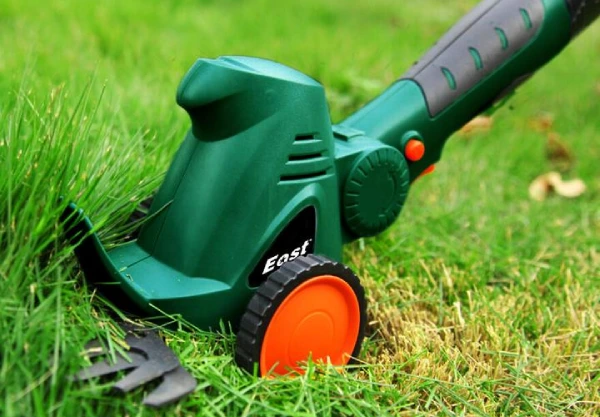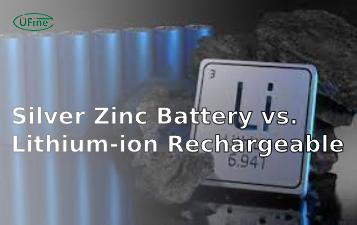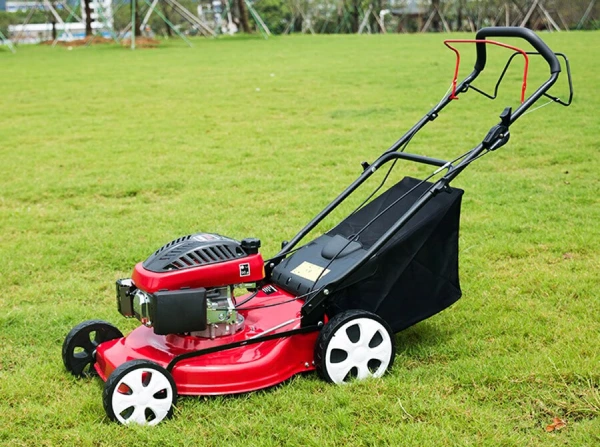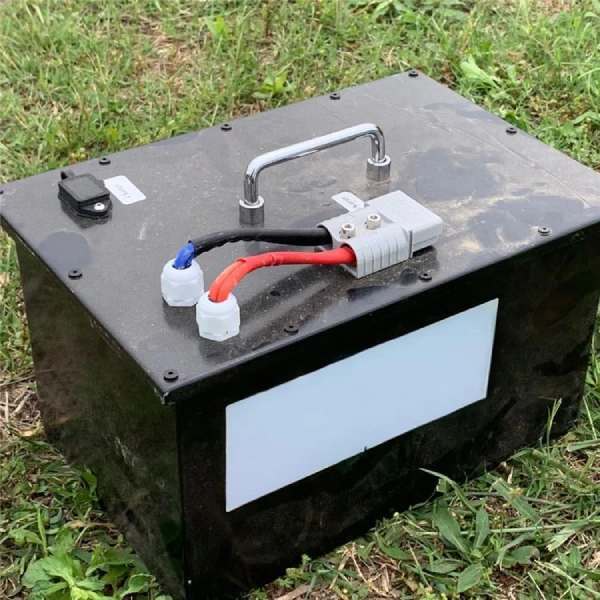
- Part 1. Lawn mower type
- Part 2. How many volts is a lawn mower battery?
- Part 3. How many amps is a lawn mower battery?
- Part 4. Best popular electric lawn mower battery
- Part 5. Lawn mower battery prices
- Part 6. How long does a lawn mower battery last?
- Part 7. Best lawn mower battery
- Part 8. Extending electric lawn mower battery life
- Part 9. Key attributes when buy a electric lawn mower battery
- Part 10. FAQs
Part 1. Lawn mower type
Let’s first talk about the general classification of lawnmowers. In terms of power systems, they can be divided into rechargeable lawnmowers, plug-in lawnmowers, and gasoline lawnmowers.
1. Cordless lawn mower

Cordless lawnmowers, as the name suggests, are powered by rechargeable batteries. With the development of battery technology, this type of lawn mower should be the mainstream in the future. It is easy to operate, is not affected by power supply, and can be used in a variety of situations. It is also small, lightweight, can be operated by housewives and the elderly, and has low noise. It has become more and more mainstream for use on small lawns at home.
More importantly, this kind of machine can generally use different blades according to different objects. For example, you can use film to cut young grass and use a blade to cut old grass, shrubs, or even branches. And because of its small size, it can be operated freely in a small space. This will allow the work to be done without leaving any dead ends, and it can be processed thoroughly at one time without having to manually use a sickle to process it twice.
However, due to the battery capacity, this machine does not work for too long at a time and needs to be recharged every ten minutes to an hour. Therefore, it is recommended to prepare an extra battery when purchasing and use two batteries interchangeably, so that it will work more efficiently.
2. Plug-in lawn mowers
A plug-in lawn mower uses a household 220V power supply and is connected to the lawn mower through a power cord to provide continuous power to the machine. The disadvantage is that during use, the long power cord at the end of the machine may affect the convenience of operation. Moreover, it is inconvenient to use in some places due to the location of the power socket or the length of the power cord. The advantage is that as long as there is a power source, it can provide a steady stream of power, allowing the machine to work continuously and powerfully.
3. Gasoline lawn mower
Gasoline lawnmowers rely on burning gasoline to power the machine. This type of machine is generally larger in size, bulky, and inconvenient to store. The price is higher and the maintenance cost is also expensive. And the noise is high during use. This type is generally suitable for use in environments where large areas of lawn cannot be plugged in. For example, large areas of lawns are used in property management, schools, hospitals and other units.
Compared with electric lawnmowers, gasoline lawnmowers work more efficiently. The engine has more horsepower and can mow weeds faster. However, the sound will be louder than that of a generator when used, and gasoline needs to be added. It has high power and a long working time, but the noise and vibration are also more obvious, so it is suitable for places with low environmental requirements.
Part 2. How many volts is a lawn mower battery?
A lawn mower is a lead-acid or lithium-ion battery similar to automotive varieties that provides the electrical “kick” for starting a mower’s engine. Measured in Cold Cranking Amps (CCA), it must supply enough amperage to the solenoid for cranking until the engine ignites. Selecting the proper lawn mower battery type is key.
The voltage of a lawn mower battery typically depends on the type of mower. Most standard lawn mowers use either:
- 12-Volt Batteries: Common in modern riding mowers and larger models.
- 6-Volt Batteries: Found in smaller, older, or specialty models.
What Voltage Should a New Lawn Mower Battery Have?
A new lawn mower battery should display a voltage close to its rated value when fully charged:
- A 12-volt battery should read approximately 12.6 to 12.8 volts when fully charged.
- A 6-volt battery should read around 6.3 to 6.4 volts when fully charged.
Part 3. How many amps is a lawn mower battery?
The amp rating of a lawn mower battery varies based on the type and size of the mower. Commonly:
- Cold Cranking Amps (CCA): Most riding mower batteries range between 150 to 300 CCA, which is the measure of the battery’s ability to start in cold temperatures.
- Amp-Hour (Ah) Rating: Smaller walk-behind mowers may have batteries rated around 10 to 20 Ah, indicating the amount of energy the battery can store.
Part 4. Best popular electric lawn mower battery
The major varieties are lead-acid (wet, gel, or AGM) and lithium-ion chemistry. Each offers pros and cons for mowing needs:
- Lead-acid provides the lowest upfront cost but requires more maintenance.
- AGM sealed and gel models resist spills but cost marginally more.
- Lithium-ion batteries last the longest period between recharges, excel in cold weather starts, however carry a higher initial price tag.
Best Electric Lawn Mower Battery
When choosing a new lawn mower battery, consider your mower’s needs along with climate, mowing frequency, and budget. Riders may benefit from longer-range lithium packs versus casual walkers.
Part 5. Lawn mower battery prices
While worthwhile lawn mower battery types range from $30 for basic lead-acid to $200+ for commercial lithium models, your individual needs determine the value:
- Standard Lead-Acid: $30-$60
- AGM Sealed Lead-Acid: $50-$80
- Gel Cells: $70-$100
- Lithium-Ion: $150-$250
Are there lawn mower batteries under $35?
You can find some lawn mower batteries under $35. However, these will likely be:
- Smaller batteries: Suitable for smaller lawn mowers or those with less demanding power needs.
- Lower quality: May not last as long or perform as well as more expensive options.
- Limited availability: You might need to search online or at smaller, less common retailers.
Where to look:
- Online retailers: Amazon, eBay, Walmart.com often have a wider selection and price range.
- Discount stores: Check local stores like Dollar General or Family Dollar for budget-friendly options.
- Local hardware stores: Some smaller stores may have less expensive options.
Part 6. How long does a lawn mower battery last?
The lifespan of a lawn mower battery typically ranges from 2 to 5 years. The lifespan of a lawn mower battery can vary significantly based on several factors. While a general estimate of 2-5 years is often given, it’s essential to consider the nuances that impact battery longevity.
Battery Type:
- Lead-acid batteries: Typically last 200-300 charge cycles. Typically last 2-3 years with proper care. They are more affordable but require regular maintenance.
- Lithium-ion batteries: Can endure 300-500 charge cycles, with some high-quality models reaching 1000 or more. Offer a longer lifespan of 3-5 years or more. They are generally more expensive but require less maintenance.
- Lithium Iron Phosphate (LiFePO4) batteries: Often boast 2000-3000 charge cycles or more. A newer technology known for exceptional longevity, often lasting 4-6 times longer than lead-acid batteries.
Usage Patterns:
- Frequent, heavy use can accelerate battery aging.
- Short, occasional use can prolong battery life.
Maintenance:
- Proper charging, storage, and cleaning can extend battery life.
- Neglect can lead to premature failure.
Environmental Conditions:
Extreme temperatures can negatively impact battery performance and lifespan
Part 7. Best lawn mower battery
Determining the “best” lawn mower battery depends heavily on your specific needs and preferences. Factors such as lawn size, terrain, desired features, and budget will influence your decision.
That said, based on general performance and user satisfaction. A lithium-ion lawn mower battery is definitely worth considering. They’ve become increasingly popular for several reasons:
- Lightweight: Lithium-ion batteries are significantly lighter than their lead-acid counterparts, making the mower easier to handle.
- Longer lifespan: They typically last longer, reducing the need for frequent replacements.
- Consistent power: Lithium-ion batteries deliver consistent power throughout their discharge cycle, ensuring optimal performance.
- Environmentally friendly: They are free from harmful chemicals and are more eco-friendly.
Maintenance-free: Unlike lead-acid batteries, they don’t require regular maintenance like checking and refilling electrolyte levels.
However, it’s essential to consider the size of your lawn. For larger lawns, you might need multiple batteries or a particularly high-capacity one to ensure you can finish mowing without interruptions. Additionally, the initial cost of a lithium-ion battery is generally higher than a lead-acid battery, but the long-term savings and convenience often outweigh this upfront expense.
Part 8. Extending electric lawn mower battery life
Proper maintenance and care doubles a lawn mower battery’s lifespan. Some tips:
- Check lead-acid battery water levels monthly and only use distilled water for top-offs.
- Remove lead-acid batteries when storing to prevent freezing damage.
- Clean any corrosion buildup from terminals with a wire brush or lemon juice annually.
- Avoid exposing batteries to extreme heat like direct sun or sub-freezing cold for long periods.
- Only partially discharge before recharging lawn mower batteries – don’t fully drain them.
- Use a quality trickle or maintenance charger to keep lead-acid batteries optimally charged when not in use long-term.
Adhering to basic carekeeping enhances both performance and return on investment over the battery’s lifetime.
Part 9. Key attributes when buy a electric lawn mower battery
When a lawn mower battery fails and needs replacing, measure the old unit first to ensure compatibility. Other attributes to match include:
- Physical dimensions fitting the mower’s compartment
- Matching voltage rating (most mowers use 12 volts)
- Connector polarity/wiring configuration
- Sufficient CCA rating for engine size
- Watertightness for outdoor use (sealed AGM/gel preferable over wet lead acid)
- Manufacturer warranty coverage in case of early defects
Stick to reputable lawnmower battery brands for quality. Also, inspect seller ratings when ordering online. Procuring lawn mower batteries from a local parts chain allows for verifying fit and specs too.
Overall, lawn mower batteries deserve the same level of care, maintenance, and replacement attentiveness as an automobile’s to maximize performance seasons. Even small investments like periodic charging safeguard significantly more expensive components.
In conclusion, the right lawn mower battery maintained properly can offer years of reliable lawn care assistance. Follow the tips covered to extend usefulness and better maintain peak starting ability season after season. With the proper type, care, and replacement attentiveness, a mower’s battery need not become an afterthought.
Part 10. FAQs
-
Is it necessary to “match” a new battery to an older one?
Not required, but using batteries of similar age/condition avoids imbalance issues. -
How long should a lawn mower battery last with proper care?
One to three mowing seasons on average, or three to five years for lithium models. -
Is it okay to leave the battery connected during winter storage?
No, removing and fully charging indoors above freezing temperature extends lifespan. -
What voltage do most lawnmowers run on?
Twelve volts is standard for automotive and most mowers. Always verify it matches the existing battery. -
How can you test if a battery is still holding a charge?
If a lawn mower fails to crank after several attempts, the battery likely needs replacing. Professional testing can also determine the state of health.
Related Tags:
More Articles

What is the Difference Between Silver Zinc Battery vs. Lithium-ion Rechargeable?
Compare silver zinc and lithium-ion rechargeable batteries: energy density, cycle life, safety, cost, and uses in drones, medical devices, EVs, and electronics.
What are Watts and Watt Hours in Battery?
Understand watt vs watt-hour in batteries: key differences, how to calculate capacity, and why they matter. Includes free comparison table.
Best 10 Blood Pressure Monitor Battery Review: Finding the Most Reliable
Are you looking for a reliable Blood Pressure Monitor battery? Here is a complete guide with the top 10 best blood pressure monitor batteries.
Bluetooth Headphone Battery Guide: All You Need to Know
Maximize headphone battery life with expert tips! Learn how to charge, check, troubleshoot, and choose the best bluetooth headphone battery in 2025.
LiFePO4 Battery VS. Lithium-ion Polymer Battery: Which One Is Best?
Comprehensive comparison of LiFePO4 vs Lithium Ion Polymer batteries: energy density, safety, lifespan, cost. Find out which battery suits your needs in 2025.





